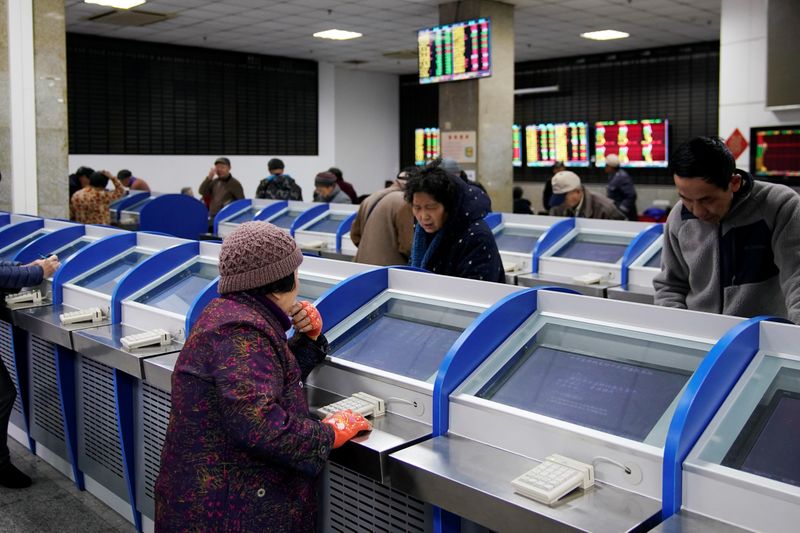This post was originally published on this site
https://i-invdn-com.akamaized.net/trkd-images/LYNXMPEG0R0AW_L.jpg © Reuters. Investors look at computer screens showing stock information at a brokerage house in Shanghai
© Reuters. Investors look at computer screens showing stock information at a brokerage house in ShanghaiSYDNEY (Reuters) – Shares of companies highly exposed to China’s economy tumbled across Asia on Tuesday on rising concern about the impact of global travel bans associated with a new virus outbreak, and even as some stocks involved in preventative health spiked.
After the United States and Canada warned against travel to China where the new coronavirus is thought to have originated, Australian stocks resumed trading sharply lower after a public holiday the previous day. The benchmark S&P/ASX 200 index () fell 1.4% weighed by stocks exposed to the illness that has killed more than 100 people and infected more than 2,700.
Shares of airlines and travel agents were sharply lower amid freezes on travel into and out of the world’s second largest economy, while companies with an indirect exposure to Chinese consumer spending abroad, such as casinos and luxury retailers, also tumbled.
“We don’t know how long it will go,” said Peter Costello, chairman of Australia’s $115 billion sovereign wealth fund, the Future Fund, in a media briefing to coincide with a regular portfolio update.
“Obviously we hope that the measures that have been taken now will contain the virus but it’s still far too early. It will have an obvious negative effect on the Australian economy and indeed beyond,” added Costello, a former Australian treasurer.
With Chinese markets closed for the week-long new year holiday, other stock markets in Asia were feeling an outsized impact of investor concerns.
South Korean cosmetic makers highly dependent on Chinese tourists coming to Seoul stumbled, with Tonymoly (KS:) and Able C&C (KS:) losing more than 12% and 15%, respectively on Tuesday.
Japanese travel company H.I.S. (T:), which owns an amusement park popular with Chinese tourists in Nagasaki, has tumbled more than 14% since early last week.
Shares of Australia’s biggest airline Qantas Airways Ltd (AX:) were down 5% on Tuesday, while travel agent Webjet Ltd (AX:) fell 11%. South Korea’s top two airlines, Korean Air Lines (KS:) and Asiana Airlines (KS:), dropped 6% and 5%. Japan Airlines (T:) lost 7.9% and airline ANA Holdings (T:) was down 6.0%.
Australia’s top two casino companies Crown Resorts Ltd (AX:) and Star Entertainment Group ltd (AX:), which both get a sizeable portion of revenue from vacationing Chinese gamblers, each fell about 5%.
Traders meanwhile pointed to companies which might generate sales from efforts to curb the spread of coronavirus as investment prospects.
Shares of South Korean mask producer Monalisa (KS:) surged 29%, while South Korean pharmaceuticals Kukje Pharma (KS:) and Woojung Bio (KQ:) added 29% and 21% respectively on Tuesday.
Japan’s Kawamoto Corp (T:), which supplies medical products including masks, saw its share prices tripled, while Japanese protective clothing maker Azearth (T:) rose 53% in the past week.
Malaysia’s Top Glove Corp (KL:) has seen its shares surge by a quarter in a week.
Fusion Media or anyone involved with Fusion Media will not accept any liability for loss or damage as a result of reliance on the information including data, quotes, charts and buy/sell signals contained within this website. Please be fully informed regarding the risks and costs associated with trading the financial markets, it is one of the riskiest investment forms possible.

